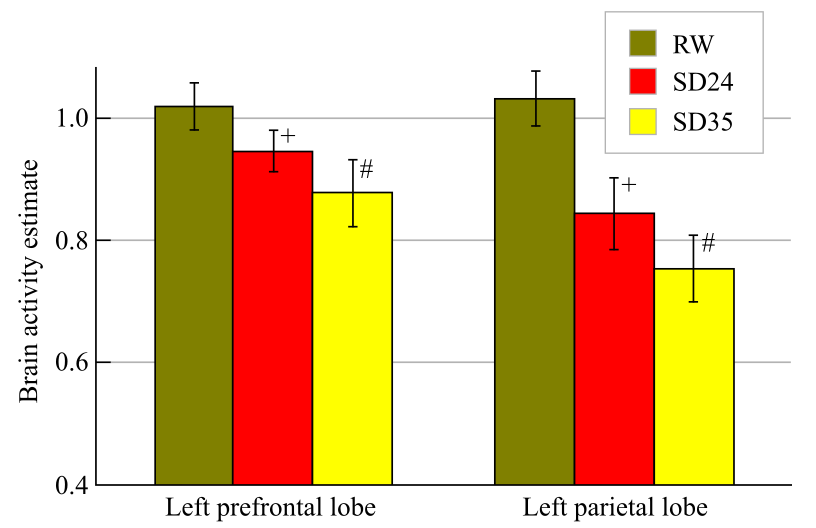
Life: The Science of Biology
11th Edition
ISBN: 9781319010164
Author: David E. Sadava, David M. Hillis, H. Craig Heller, Sally D. Hacker
Publisher: W. H. Freeman
expand_more
expand_more
format_list_bulleted
Question
Chapter 46, Problem 4Q
Summary Introduction
To review:
The parietal lobe is more affected by sleep-deprivation than the frontal lobe.
Given:
The brain activity in the left prefrontal and parietal lobes of well-rested (RW) subjects and subjects sleep deprived for 24 hours (SD24) and 35 hours (SD35) is shown in the Graph 1:

Graph 1: The brain activity in the left prefrontal and parietal lobes.
Introduction:
Magnetic resonance imaging (MRI) was used to measure the brain activity in different regions of the brain while conducting the likelihood ratio test (LTR) () and PLUS tests. The two regions of the brain, which showed the most significant differences in sleep-deprived (SD) and well-rested (RW) subjects were the left prefrontal lobe and the left parietal lobe.
Expert Solution & Answer
Want to see the full answer?
Check out a sample textbook solution
Students have asked these similar questions
34.
Elon wants to find a way to prevent visitors to his factory and labs from remembering anything about what they've seen. He asks you to come up with a couple of ways of preventing the formation of declarative memories. Pretend you have no morals whatsoever and can be as invasive as you'd like. Which of the following techniques would be LEAST effective for this goal?
a.
Administering a CaMKIIa inhibitor on the hippocampus
b.
Destroying the hippocampus
c.
Destroying the prefrontal cortex
d.
Administering a NMDA receptor blocker in the hippocampus
In the past, aspiring London taxicab drivers underwent a rigorous education that required them to learn the location of about 25,000 streets in the city. The average posterior hippocampus of London cabbies, as revealed by magnetic resonance imaging, was larger than that in a comparable group of London bus operators, who follow a fixed route and so do not have to learn a detailed map of the city (Maguire et al. 2000). In addition, the more years of taxi driving, the larger the posterior hippocampus (Maguire et al. 2006). What does this research tell us about the interplay of the environment and genetics in the development of adaptive navigational skills in human beings?
Please don't write from any online source.
MRI and PET scans have shown that patients at early stages of Alzheimer’s disease
have medial temporal lobe atrophy and decreased neural activity in the parietal lobe
and frontal lobe.
Identify the symptoms of early onset Alzheimer’s disease that can result from these
affected areas of the brain listed below.
• Medial temporal lobe
• Parietal lobe
• Frontal lobe
Chapter 46 Solutions
Life: The Science of Biology
Knowledge Booster
Learn more about
Need a deep-dive on the concept behind this application? Look no further. Learn more about this topic, biology and related others by exploring similar questions and additional content below.Similar questions
- Could you please draw the Paypez circuit as a loop and not inside the brain? The circuit goes through the following neural pathways: Hippocampal formation (subiculum) → fornix → mammillary bodies → mammillothalamic tract → anterior thalamic nucleus → cingulum → entorhinal cortex → hippocampal formation.arrow_forwardThere is no single "sleep center" or "waking center" in the brain. Which forebrain arousal center helps to maintain wakefulness by releasing orexin (a.k.a., hypocretin) and maintaining activity in the prefrontal cortex? A) Raphe nuclei B) Lateral hypothalamus (LH) C) Basal forebrain D) Pedunculopontine (PPT) and laterodorsal tegmental (LDT) nucleiarrow_forwardSigmund Freud is probably one of the most well-known historical figures in psychology. Where have you encountered references to Freud or his ideas about the role that the unconscious mind plays in determining conscious behaviour?arrow_forward
- * 00 T F 开3 QUESTION 33 The brain injury suffered by 19 century railroad worker Phineas Gage allowed psychologist to learn about the functions of the brain frontal lobe's. However, there is evidence that Gage recovered to some degree, illustrating the OA. Remarkable neuroplasticity of the brain B. Role of the temporal lobe's in personality OC. Effectiveness of the hemispherectomy in preventing seizures D. Function of the limbic system QUESTION 34 A relatively enduring change in behavior or thinking that results from experiences is called OA. Development B. Learning C. Cognition Click Save and Submit to save and submit. Click Save All Answers to save all answers. MacBook Air 08 F3 of F4 F7 F5 2. & #3 2$ 5. 9. R | Narrow_forwardPlease answer question 1 in your own words and question 2 using the image below. Thank you Q1: The prefrontal lobotomy is a drastic—and largely out of-practice—procedure used to disconnect that portion of the cerebral cortex from the rest of the frontal lobe and the diencephalon as a psychiatric therapy. What is the normal function of this part of the brain? Why would this have been thought necessary for someone with a potentially uncontrollable behavior? Q2:arrow_forwardThe ____ receives a large amount of information from the amygdala. It's the final destination for most of the brain's information about emotion before action is taken. For this reason, patients with damage to this region often struggle to make decisions, especially when those decisions involve avoiding risks or learning from reinforcement and punishment. A) ventromedial prefrontal cortex B) posterior parietal cortex C) anterior insular cortex D) anterior cingulate gyrusarrow_forward
- Please help me with the following question and explain a little Q : Research has found links between the lack of sleep and which health concerns? Name 2.arrow_forwardFollowing a stroke Dr. Z was unable to recognize the members of his family when shown their portrait. It was different when he was in their physical presence, because then if he heard them speak or saw them move in particular ways he could identify them. Where is the most likely site of brain damage? Question 3 options: A) Ventral pathway from V1 to the fusiform gyrus B) Ventral pathway from V1 to amygdala C) Dorsal pathway from V1 to motor cortex D) Primary visual (V1) cortexarrow_forwardLong-term stress and sleep deprivation is associated with memory loss and negative thoughts.Subjects in a research study were shown images after they received either a full night’s rest or limited rest. The subjects were shown negative, positive, and neutral images. The subjects with limited rest remembered most of the negative images but only half of the positive and neutral images.The structures of the brain affected by long-term stress and sleep deprivation are, respectively: Select one: a. Long-Term Stress Sleep Deprivation Temporal lobe Frontal lobe b. Long-Term Stress Sleep Deprivation Temporal lobe Parietal lobe c. Long-Term Stress Sleep Deprivation Frontal lobe Occipital lobe d. Long-Term Stress Sleep Deprivation Frontal lobe Parietal lobearrow_forward
- Which of the following is correct about the MTL system? a. medial temporal lobe areas receive inputs mainly from frontal association areas b. medial temporal lobe areas receive inputs from many association areas in the neocortex c. according to the “standard model,” recent memory involves the medial temporal hippocampal system whereas remote memory involves amygdala connections with the MTL system d. according to the “standard model,” recent memory involves amygdala connections whereas remote memory involves the medial temporal hippocampal system e. Both A & Carrow_forwardScenerio: Is Cognitive Processing Therapy (CPT) more effective in treating PTSD than Prolonged Exposure therapy (PE)? Question 1: Does this question represent a correlational or experimental research design? Why? Question 2: Which of the two models would state that there is nothing interesting going on between CPT and PE in treating PTSD? Question 3: . State the alternative hypothesis for this study. Question 4: State the null hypothesis for this study. Question 5: Are your hypotheses directional or non-directional? How do you know this? Question 6: Suppose you run the study, and the results come out with a p value of .23. What can you conclude about the difference between the treatments? Question 7: In this case, would you decide to reject or fail to reject the null hypothesis? Why?arrow_forwardOf the following, which is the strongest evidence to indicate that musical training modifies brain anatomy? a. The gray matter of several cortical areas is thicker in professional musicians than in nonmusicians. b. A larger than average portion of the right somatosensory cortex responds to the left hand in stringed instrument players than in other people. c. At age 6, children starting musical training did not differ from average, but 15 months later they showed enlargements of several brain areas.arrow_forward
arrow_back_ios
SEE MORE QUESTIONS
arrow_forward_ios
Recommended textbooks for you
 Human Anatomy & Physiology (11th Edition)BiologyISBN:9780134580999Author:Elaine N. Marieb, Katja N. HoehnPublisher:PEARSON
Human Anatomy & Physiology (11th Edition)BiologyISBN:9780134580999Author:Elaine N. Marieb, Katja N. HoehnPublisher:PEARSON Biology 2eBiologyISBN:9781947172517Author:Matthew Douglas, Jung Choi, Mary Ann ClarkPublisher:OpenStax
Biology 2eBiologyISBN:9781947172517Author:Matthew Douglas, Jung Choi, Mary Ann ClarkPublisher:OpenStax Anatomy & PhysiologyBiologyISBN:9781259398629Author:McKinley, Michael P., O'loughlin, Valerie Dean, Bidle, Theresa StouterPublisher:Mcgraw Hill Education,
Anatomy & PhysiologyBiologyISBN:9781259398629Author:McKinley, Michael P., O'loughlin, Valerie Dean, Bidle, Theresa StouterPublisher:Mcgraw Hill Education, Molecular Biology of the Cell (Sixth Edition)BiologyISBN:9780815344322Author:Bruce Alberts, Alexander D. Johnson, Julian Lewis, David Morgan, Martin Raff, Keith Roberts, Peter WalterPublisher:W. W. Norton & Company
Molecular Biology of the Cell (Sixth Edition)BiologyISBN:9780815344322Author:Bruce Alberts, Alexander D. Johnson, Julian Lewis, David Morgan, Martin Raff, Keith Roberts, Peter WalterPublisher:W. W. Norton & Company Laboratory Manual For Human Anatomy & PhysiologyBiologyISBN:9781260159363Author:Martin, Terry R., Prentice-craver, CynthiaPublisher:McGraw-Hill Publishing Co.
Laboratory Manual For Human Anatomy & PhysiologyBiologyISBN:9781260159363Author:Martin, Terry R., Prentice-craver, CynthiaPublisher:McGraw-Hill Publishing Co. Inquiry Into Life (16th Edition)BiologyISBN:9781260231700Author:Sylvia S. Mader, Michael WindelspechtPublisher:McGraw Hill Education
Inquiry Into Life (16th Edition)BiologyISBN:9781260231700Author:Sylvia S. Mader, Michael WindelspechtPublisher:McGraw Hill Education

Human Anatomy & Physiology (11th Edition)
Biology
ISBN:9780134580999
Author:Elaine N. Marieb, Katja N. Hoehn
Publisher:PEARSON

Biology 2e
Biology
ISBN:9781947172517
Author:Matthew Douglas, Jung Choi, Mary Ann Clark
Publisher:OpenStax

Anatomy & Physiology
Biology
ISBN:9781259398629
Author:McKinley, Michael P., O'loughlin, Valerie Dean, Bidle, Theresa Stouter
Publisher:Mcgraw Hill Education,

Molecular Biology of the Cell (Sixth Edition)
Biology
ISBN:9780815344322
Author:Bruce Alberts, Alexander D. Johnson, Julian Lewis, David Morgan, Martin Raff, Keith Roberts, Peter Walter
Publisher:W. W. Norton & Company

Laboratory Manual For Human Anatomy & Physiology
Biology
ISBN:9781260159363
Author:Martin, Terry R., Prentice-craver, Cynthia
Publisher:McGraw-Hill Publishing Co.

Inquiry Into Life (16th Edition)
Biology
ISBN:9781260231700
Author:Sylvia S. Mader, Michael Windelspecht
Publisher:McGraw Hill Education
Nervous System - Get to know our nervous system a bit closer, how does it works? | Neurology; Author: FreeMedEducation;https://www.youtube.com/watch?v=6O-0CVAgaEM;License: Standard youtube license